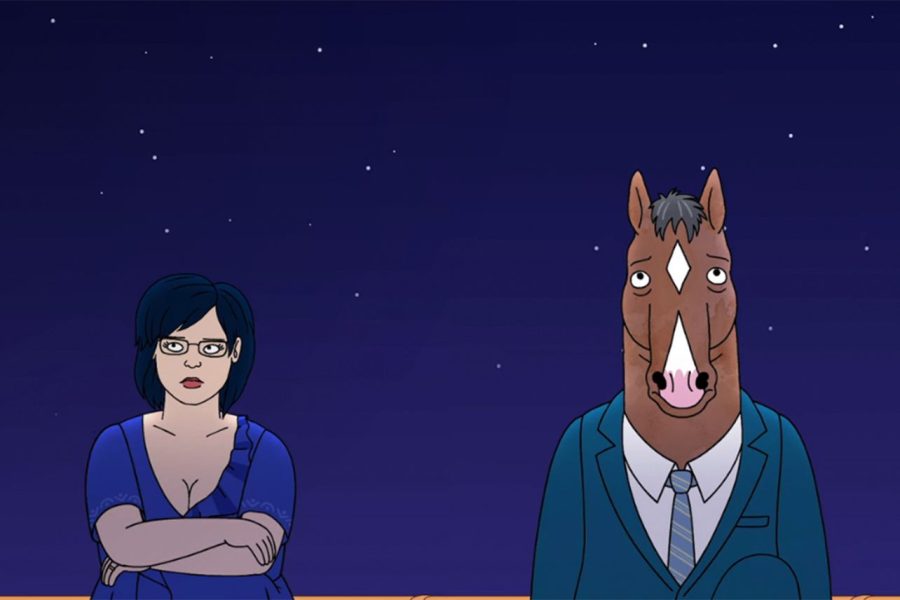The final episodes of “BoJack Horseman” bring us careful closure to the painful and nonlinear nature of personal growth.
“But no matter how many starts I get, there’s always the same ending. Everything falls apart and I end up alone” (23:24 S6E11). Was this the same ending? Did everything fall apart, with BoJack alone? Regardless, the time has come for the end of the sad horse show. Since its 2014 premiere, “BoJack Horseman” has taken us along a tumultuous journey through very real societal issues. Over the past six years, “BoJack Horseman” has tackled the commodification of young pop stars, depression, abortion rights, addiction, and all-mighty capitalism in its modern American capacity, constructing vastly realistic and socially conscious scenes with its warped yet engaging set of anthropomorphic characters.
A cornerstone of “BoJack Horseman” has been its use of distinctively different animation styles to mirror the emotional unravelings of its main characters, and these last episodes were no different. Beginning with Diane Nguyen, BoJack’s ghostwriter-turned-friend, we are taken into a storyboard-esque sequence of unprocessed childhood trauma and a deeply personal fear of failure. As a character who has openly been through therapy and uses antidepressants, she is confronted with the experiences that have already been discussed in clinical settings. Although Diane is not the titular character, her personal growth continually exhibits the chaotic nonlinear nature of recovery with as much potency as BoJack’s own arc. When Diane is unable to use her own traumatic past to create the powerful memoir she always dreamed of, the show challenges the idea of having “useful trauma” and what it means for art to be valuable. The show never shies away from the mess of growing and existing through involuntary formative pain. Even in the heightened world of an animated television show, its experiences feel honest.
Outside the subplot of Diane’s mental health novel writing adventures, we see prominent moments in Todd and Princess Carolyn’s respective character arcs. We see Todd and his mother interact for the first time in years; and we see Princess Carolyn find out what balance looks like for herself, as well as the evolution of work’s role in her life. Although these final episodes track several different principal characters, the characters are consistently grounded in their relationships to BoJack, which the show is able to navigate in complex ways. Each character is guilty of self-sabotage, which “BoJack Horseman” manages to capture with a perfect balance of specificity and relatability. While their situations are unique, all characters hold an underlying sentiment of what human connection can be, and what it might deserve, in context of the self. During a particularly charged scene in Episode 14, we see Todd, Princess Carolyn, BoJack, and Diane in a crosscut sequence depicting each character amidst gutting interpersonal experiences. Diane’s voice narrates with a sigh, “But at some point, you start to think it’s you. You’re the piece that doesn’t quite fit. And you spend so long with that feeling that the feeling becomes your home” (18:52 S6E14). At its core, the show’s utilization of strong, character-driven narratives allows its messages of healing to seep so incredibly deep into viewers’ emotional centers that you’re almost left wondering how a cartoon made you feel again.
And finally, onto BoJack Horseman, the star of the show, the star of a show within a show, and another show within a show after that. Whereas the first half of Season 6 demonstrated seemingly vast strides in BoJack’s alcoholism, selfishness, and generally self-destructive behaviors, the second half of Season 6 serves as a reminder that the process of “moving on” is by no means a linear path. Although BoJack desires a fresh start in his new career as an acting professor at Wesleyan College, he remains tethered to his past mistakes through determined journalists, ex-friendships, and spotlighted complicity. Through a “20/20” style exposé, we are all confronted with BoJack’s inappropriate relationships with former co-star Sarah-Lynn, an ex-friend’s daughter Penny Carson, former lover Princess Carolyn, and many other younger, female characters. BoJack is held accountable for his actions in a very public fashion, where “fresh starts” are myths people tell themselves to placate their guilt over their mistakes.
The final episodes of “BoJack Horseman” concretize consequences and achingly entrenched emotional turmoil. They are a concentrated but fitting whirlwind that culminates in closure metered by BoJack’s relationships to other characters. We come to an understanding that some will leave BoJack, and some just might stay. Many of the continuing jokes established in the first season are paralleled as markers of change at the chronological end of nonlinear healing. The “Hollywoo” sign becomes “Hollywoob,” BoJack finds honeydew to actually be pleasant, Princess Carolyn offers agent advice, and Diane has one final conversation with BoJack on the roof. “It’s funny, isn’t it? The things that matter. The truth is none of it matters and the truth is it all matters tremendously. It’s a wonder any of us get out of bed at all. And yet, we get out of bed” (16:54 S6E14).
I have tremendous gratitude for “BoJack Horseman”: where animation captures people at their most human and where emotional validity, actionable morality, confusion, pain, living, healing, and more come to play.
Grade: A
Creator: Raphael Bob-Waksberg
Starring: Will Arnett, Amy Sedaris, Alison Brie, Aaron Paul, Paul F. Tompkins
Premiered: January 31, 2020
Rated: TV-MA














